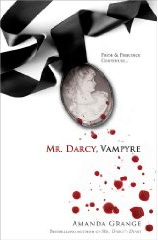Review: Just Jane: A Novel of Jane Auten’s Life by Nancy Moser
Posted in Review on September 6th, 2009 I’d been having Just Jane by Nancy Moser popping up on my recommendations on Amazon for quite a while and saw it on sale at Sam’s Club and thought what the heck might as well give it a try. Besides the reviews on Amazon when I checked it out seemed mainly positive.
I’d been having Just Jane by Nancy Moser popping up on my recommendations on Amazon for quite a while and saw it on sale at Sam’s Club and thought what the heck might as well give it a try. Besides the reviews on Amazon when I checked it out seemed mainly positive.
As a novel of the life of Jane Austen, Just Jane covers the facts of her life adequately. Told from the point of view of Jane, you’d expect the same wittiness that Austen was known for but in that regard it never quite gets up to what I expected. However, the author, as it turns out, didn’t expect to write to the voice of Austen just the facts of Austen. Having recently read, Cassandra and Jane: A Jane Austen Novel by Jill Pitkeathley, I found Just Jane to be much kinder to Cassandra and much more clinical in the laying out of Austen’s life story.
As a narrative of the life of Jane Austen, Just Jane works and works well. It covers all the highlights of the family, their inter-relationships, visits, births, deaths, marriages, moves, the books and their publication. It just never got me to make an emotional attachment to Jane Austen. This was surprising because in many ways Jane Austen was a precursor to the modern woman. She was a woman who chafed at not being able to control her own life, manage her own monetary affairs or even control her publications without a male taking part in the business of publishing. However, with the support and encouragement of her family, she wrote books that are still in print and revered today for her incisive portrayal of her society. Jane Austen was a clear eyed observer of what went on around her. She studied people and herself and managed to give her readers a look at what life was like for people in that strata of society. The fact that they were also in many ways love stories with the female characters getting married at the end didn’t hurt either.
While Moser does an admirable job of presenting the factual time line as a fictional narrative, it lacks the passion and emotional impact that I would have liked to have read for a fictionalized biography of the author. So while it didn’t really tell me any more than I already knew, or make me feel like I understood Jane Austen any better, it was an interesting and factual account of her life as we know it from Austen’s letters and writings.
I’m not going to comment on the religious overtones of the characterization of Jane Austen because I have no real way to know how she acted around others during her lifetime. However, I do feel that, based on the times, that she wouldn’t feel the need to resort to telling people she was going to pray for them or the Lord would take care and so on and so on. Why? Because at that time religion was such an integral part of life that it would go without saying that prayers would be said for those in need. As the daughter and sister of ministers, Austen’s life was steeped in religion and the church and it would “just” be and not need mentioning. I think it’s fairly common now-a-days to point out how religious one is in order to show just how important religion is to their life — actions speak louder than words and always have. It would be unnecessary to continually harp on the religious nature of Austen’s life because her actions in visiting the poor, helping her neighbors, traveling miles to be with a friend who is caring for an ill relative — give the same information via the acts. Since the actions are in the story, the words are unnecessary and without the actions they are not to be believed.
All in all, an interesting fictionalized biography of Jane Austen. However, Cassandra and Jane has more of an emotional undercurrent that infuses the incidents with emotional as well as factual weight while Just Jane remains at arm’s length. I’m not sorry I read Just Jane, and I’d recommend it for someone looking for a fictional biography. I just feel that it could have been better, especially since it is told from Jane Austen’s point of view, if it had approached Austen’s wit and cleverness.








